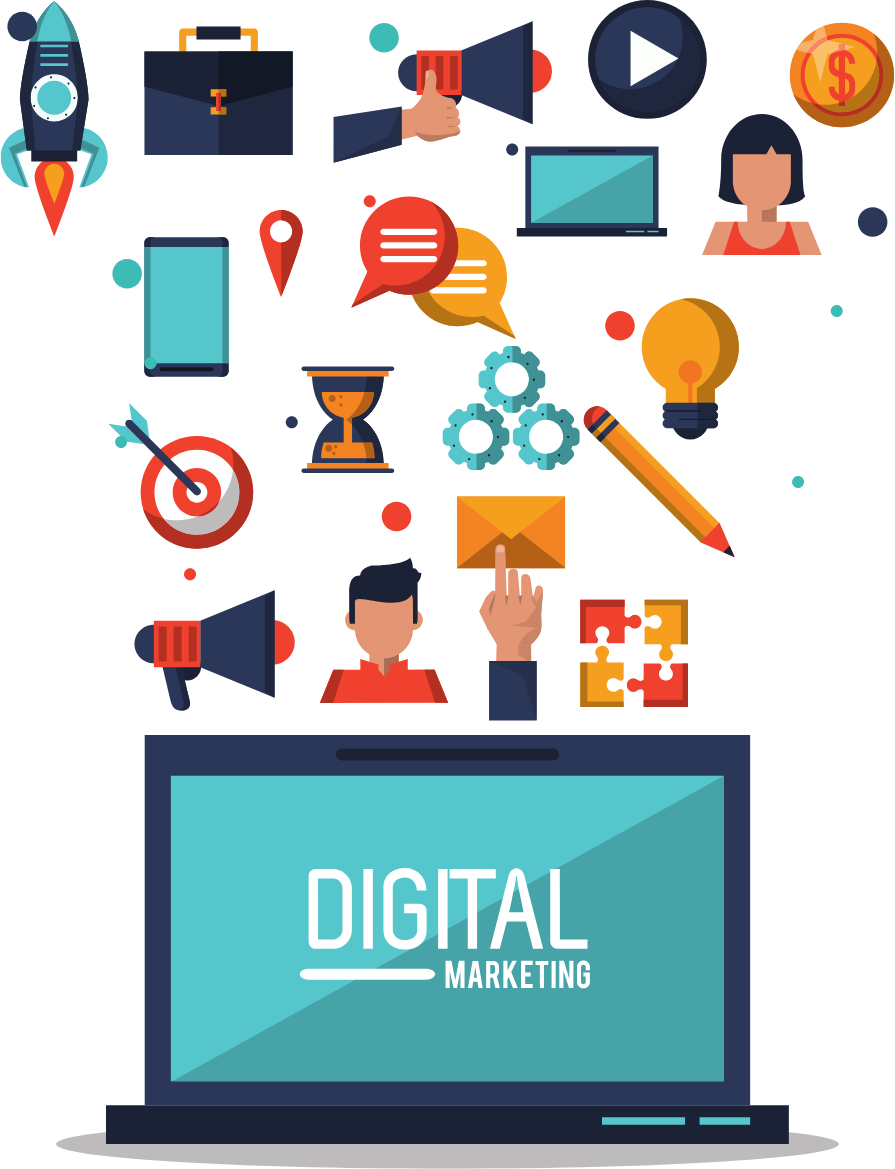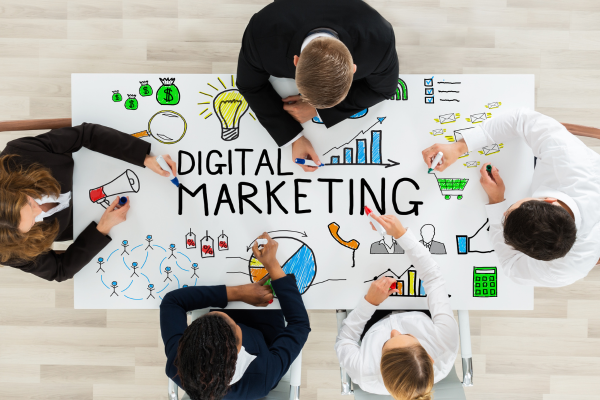Digital marketing is rapidly evolving and has become essential for businesses and professionals alike. As we approach 2025, new technologies, shifting consumer behaviors, and innovative strategies are reshaping the marketing landscape. This comprehensive guide explains why learning digital marketing in 2025 is crucial, outlines the benefits and opportunities, and provides a step-by-step approach for beginners. Whether you’re aiming to launch your career, start your own business, or simply keep up with industry trends, understanding digital marketing will equip you with the skills necessary to thrive in the digital world.

Table of Contents
ToggleIntroduction
Digital marketing has become a cornerstone of modern business, influencing how companies reach, engage, and convert their audiences. In 2025, as technology continues to advance, digital marketing is more dynamic and complex than ever before. For beginners, understanding the fundamentals of digital marketing is crucial—not only to stay competitive in today’s job market but also to harness new tools and strategies that drive growth and success.
This guide explains why learning digital marketing in 2025 is imperative. We will explore the latest trends, key benefits, emerging technologies, and practical steps to kickstart your journey. By the end of this guide, you’ll understand why now is the perfect time to dive into digital marketing and how to build a solid foundation for a successful career.
The Digital Marketing Revolution: A 2025 Perspective
The digital landscape is in a constant state of evolution. In 2025, several factors contribute to the significance of digital marketing:
- Technological Innovations: Technologies such as artificial intelligence (AI), machine learning, and augmented reality (AR) are revolutionizing marketing strategies. These innovations enable businesses to create personalized experiences and optimize campaigns with precision.
- Changing Consumer Behavior: Today’s consumers are highly connected, relying on smartphones, social media, and voice-activated devices to gather information and make purchasing decisions.
- Increased Competition: With more businesses going digital, standing out requires advanced strategies and a deep understanding of online marketing techniques.
- Data-Driven Strategies: The rise of big data and advanced analytics allows marketers to make informed decisions, predict trends, and measure performance accurately.
Given these dynamics, digital marketing is not just a passing trend—it’s the future of business. For beginners, this means acquiring digital marketing skills is essential for building a successful career or business in the coming years.
Key Reasons to Learn Digital Marketing in 2025
High Demand for Digital Skills
Explanation:
As companies shift their focus from traditional to digital channels, the demand for digital marketing professionals continues to rise. Businesses need experts who can drive online traffic, optimize conversion rates, and create engaging content.
Details:
- Career Opportunities: Roles in SEO, content marketing, social media management, and PPC advertising are in high demand.
- Remote Work: Digital marketing skills enable remote work opportunities, allowing professionals to work from anywhere.
- Freelance and Entrepreneurial Opportunities: With the right skills, you can start your own digital marketing agency or work as a freelance consultant.
Example:
According to LinkedIn and various job boards, digital marketing roles have seen consistent growth, with skills in SEO and social media being particularly sought-after by employers.
Rapid Technological Advancements
Cost-Effective Marketing Strategies
Explanation:
The rapid evolution of technology is changing the way marketers reach their audience. New tools, platforms, and automation techniques are emerging every day, making digital marketing more efficient and effective.
Details:
- Artificial Intelligence and Machine Learning: AI tools help automate routine tasks, personalize customer experiences, and provide data-driven insights.
- Voice and Visual Search: Innovations in voice recognition and image processing are reshaping search engine optimization strategies.
- Automation Tools: From scheduling social media posts to managing email campaigns, automation is streamlining digital marketing workflows.
Example:
Tools like ChatGPT and Jasper are revolutionizing content creation, while platforms like Google Ads and Facebook Ads continue to evolve with advanced targeting options powered by AI.
Explanation:
Digital marketing offers a cost-effective alternative to traditional advertising channels. With lower entry barriers and measurable results, businesses can achieve significant results without breaking the bank.
Details:
- Lower Advertising Costs: Online advertising platforms allow you to set budgets and only pay for results, such as clicks or conversions.
- Scalable Campaigns: Digital marketing campaigns can be scaled up or down based on performance and budget constraints.
- High ROI: Effective digital marketing strategies can yield high returns on investment (ROI), as seen in various case studies and industry reports.
Example:
Email marketing, for instance, offers an average ROI of up to $36 for every dollar spent, making it one of the most cost-effective strategies in digital marketing.
Global Reach and Scalability
Explanation:
Digital marketing breaks down geographical barriers, allowing businesses to reach a global audience. With effective strategies, even small businesses can establish a strong presence and compete globally.
Details:
- Online Presence: A well-optimized website can attract visitors from all over the world.
- Multilingual Capabilities: With tools for translation and localization, content can be tailored for different regions.
- Social Media Reach: Platforms like Facebook, Instagram, and LinkedIn allow for international engagement and community building.
Example:
E-commerce platforms like Amazon and Shopify empower small businesses to sell their products worldwide, thanks to digital marketing strategies that target global consumers.
Data-Driven Decision Making
Explanation:
Digital marketing provides access to vast amounts of data that can be analyzed to make informed decisions. This data-driven approach reduces guesswork and allows for continuous optimization.
Details:
- Analytics Tools: Tools like Google Analytics, SEMrush, and Ahrefs provide insights into user behavior, traffic sources, and campaign performance.
- Real-Time Monitoring: Marketers can track metrics in real time, enabling quick adjustments to strategies.
- Predictive Analytics: Advanced techniques allow for forecasting future trends, helping businesses stay ahead of the competition.
Example:
A/B testing different ad creatives and landing pages can lead to significant improvements in conversion rates, as data helps pinpoint what works best.
Career Growth and Opportunities
Explanation:
Learning digital marketing opens up a multitude of career opportunities in various industries. As businesses continue to invest in online marketing, the demand for skilled digital marketers will only increase.
Details:
- Diverse Job Roles: Roles include SEO specialists, content marketers, social media managers, PPC analysts, and digital marketing strategists.
- Freelance and Remote Work: The digital nature of the work allows for flexible job arrangements and remote opportunities.
- Continuous Learning: Digital marketing is an ever-evolving field, offering ongoing learning and growth opportunities.
Example:
Digital marketing roles are among the fastest-growing job categories, with professionals enjoying high salaries, remote work options, and the ability to work across industries.
Emerging Trends in Digital Marketing for 2025
In addition to the key reasons to learn digital marketing, several emerging trends are set to transform the landscape in 2025:
AI and Machine Learning
AI is revolutionizing digital marketing by automating tasks, personalizing content, and optimizing campaigns. Marketers can now leverage AI to gain deeper insights, predict customer behavior, and tailor their strategies accordingly.
- Example: AI-powered chatbots and content creation tools are becoming industry standards.
Voice and Visual Search
With the growing use of voice assistants like Alexa and Google Assistant, and the rise of image-based search tools, optimizing for voice and visual search is critical.
- Example: Businesses are now focusing on long-tail, conversational keywords to capture voice search queries.
Omnichannel Marketing
Consumers expect a seamless experience across all digital platforms. Omnichannel marketing integrates multiple channels—social media, email, mobile, and more—to provide a consistent customer journey.
- Example: Unified customer profiles help deliver personalized experiences across channels.
Data Privacy and Security
As digital marketing becomes more data-driven, concerns over privacy and security are on the rise. Marketers must ensure they comply with regulations like GDPR and CCPA while maintaining transparency with customers.
- Example: Implementing robust data security measures builds trust and protects brand reputation.
Sustainability and Ethical Marketing
Modern consumers increasingly value sustainability and ethical practices. Brands that promote eco-friendly and socially responsible values are more likely to gain customer loyalty.
- Example: Highlighting sustainable practices in marketing campaigns can differentiate your brand from competitors.
Augmented Reality (AR) and Virtual Reality (VR)
AR and VR technologies are creating immersive marketing experiences. These technologies allow customers to interact with products in a virtual environment, enhancing engagement and conversion rates.
- Example: Virtual try-ons in fashion and beauty industries provide a unique customer experience.
How to Get Started with Digital Marketing in 2025
Step 1: Build a Strong Foundation
- Education: Enroll in digital marketing courses through platforms like Google Digital Garage or HubSpot Academy.
- Practice: Start a blog or website to experiment with digital marketing strategies and tools.
Step 2: Specialize in Key Areas
- SEO and Content Marketing: Learn to optimize your website and create engaging content.
- Social Media Marketing: Master platforms like Facebook, Instagram, and LinkedIn to connect with your audience.
- PPC Advertising: Understand how to run effective ad campaigns through Google Ads and social media platforms.
- Email Marketing: Build and nurture an email list using tools like Mailchimp or ActiveCampaign.
Step 3: Leverage Emerging Technologies
- AI Tools: Use AI-powered platforms for content creation, ad optimization, and predictive analytics.
- Voice and Visual Search Optimization: Adjust your SEO strategy to include natural language and high-quality visuals.
- AR/VR: Explore immersive technologies to enhance customer engagement.
Step 4: Monitor and Optimize
- Analytics: Use tools like Google Analytics and SEMrush to track performance.
- A/B Testing: Continuously test and refine your campaigns for better results.
Step 5: Stay Informed
- Industry Blogs: Follow Search Engine Journal and Neil Patel’s Blog to stay updated on the latest trends.
- Networking: Join digital marketing communities and attend webinars or conferences.
Tools and Platforms for Digital Marketing in 2025
Utilizing the right tools is essential for implementing and optimizing your digital marketing strategy. Some recommended tools include:
- Google Analytics: For monitoring website traffic and user behavior.
- SEMrush & Ahrefs: For keyword research, site audits, and competitor analysis.
- HubSpot: For CRM, email marketing, and inbound marketing automation.
- Hootsuite & Buffer: For scheduling and managing social media campaigns.
- Canva: For creating engaging visuals and graphics.
- Mailchimp: For designing and executing email campaigns.
These tools not only help streamline your efforts but also provide valuable insights that drive continuous improvement.
Overcoming Common Challenges in Digital Marketing
Despite the vast opportunities digital marketing offers, several challenges may arise:
Adapting to Rapid Technological Changes
- Challenge: The digital landscape evolves quickly, making it difficult to keep up.
- Solution: Commit to continuous learning and subscribe to industry newsletters, blogs, and courses.
Data Privacy and Security
- Challenge: Compliance with data privacy regulations is crucial and can be complex.
- Solution: Invest in secure technologies and always be transparent about how you collect and use data.
High Competition
- Challenge: As more businesses embrace digital marketing, standing out becomes increasingly difficult.
- Solution: Focus on quality content, unique branding, and niche targeting to differentiate your offerings.
Resource Limitations
- Challenge: Small businesses may have limited budgets and manpower for extensive digital marketing campaigns.
- Solution: Prioritize cost-effective strategies such as content marketing and organic social media efforts, and leverage free tools where possible.
Measuring ROI
- Challenge: Tracking the effectiveness of digital marketing efforts can be challenging due to the complexity of online metrics.
- Solution: Define clear KPIs from the start and use comprehensive analytics tools to measure performance accurately.
Future Outlook for Digital Marketing in 2025
Looking ahead, the digital marketing landscape will continue to evolve, influenced by technological advancements and changing consumer behavior. Here are some key trends that will shape the industry:
AI and Machine Learning
AI will become more integrated into marketing strategies, providing deeper personalization and more efficient campaign management.
Voice and Visual Search
Optimizing for voice and visual search will be essential as smart devices become more prevalent.
Omnichannel Integration
A seamless customer experience across multiple channels will be critical for engaging modern consumers.
Sustainability and Ethical Marketing
Brands that embrace sustainable practices and ethical marketing will resonate more with consumers, leading to increased loyalty.
Augmented and Virtual Reality
AR and VR technologies will create immersive marketing experiences that transform how customers interact with brands.
Data Privacy and Security
Stricter regulations will drive businesses to prioritize data privacy and build trust with their audiences.
Conclusion
Learning digital marketing in 2025 is more important than ever. The rapid evolution of technology, shifting consumer behaviors, and increasing competition make digital marketing a vital skill set for professionals and businesses alike. This comprehensive guide has covered the fundamentals, emerging trends, essential tools, and strategies to help beginners get started and succeed in digital marketing.
By focusing on core components such as SEO, content marketing, social media, PPC, email marketing, and leveraging emerging technologies like AI and AR, you can build a robust digital marketing strategy that drives growth, improves ROI, and enhances customer engagement. Stay agile, continue learning, and adapt to new trends to maintain a competitive edge in the dynamic digital landscape of 2025.

